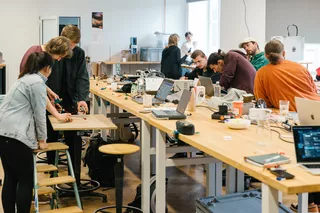May 2023: Successful restart of the International Seminar Week

In May 2023, University of Applied Sciences Schwäbisch Gmünd (HfG) hosted the International Seminar Week. A total of 20 workshops by lecturers from the HfG, but also from our partner universities, designers, and speakers from Israel, Italy, Hungary, Estonia, and Austria were on the agenda with regard to current developments in design, culture, and society.
Since 2004, University of Applied Sciences Schwäbisch Gmünd (HfG) has offered the so-called „International Seminar Week“. This year, from May 8 to 12, 2023, students from all semesters could attend workshops and lectures based on their professional interests together with lecturers from HfG partner universities: The Topics ranged from „Art in the Public Sphere of Israel“ to „Designing Prompts“ to „Human Behavior and the Way of Thinking“ and „Provoking Collaboration“. William Levi, International Coordinator at HfG, says: „Through this program, the „International Seminar Week´ is now making a successful restart in presence after the 2020 – 2022 Corona hiatus. One workshop of the program was a so-called „Blended Intensive Program“, in which – in addition to the program of the International Seminar Week – students could travel to Graz to the Joanneum University of Applied Sciences.“






Wide range of topics: from sustainability and the future of the city to Artificial Intelligence
At HfG, one of the topics available for workshop participation was „Sustainability and the Future of the City“ (Designing Urban Futures, lecturer Poonam Choudry) – with the analysis of architectural structures, sociopolitical processes, and the task for students to consider so-called „human-centered design“ in the creation of new urban concepts: Moving away from the „car-oriented city“ of the 1950s and 1960s and its urban aftermaths towards more „livable“ urban space with collaborative solution processes by design, architecture, and urban planning.
Italian lecturer Chiara Lecce from Politecnico di Milan took up the theme of „space“ in the workshop „Glimpses of Future Ways of Dwelling“ and discussed with participating students the question of what future living situations and cultures might be: What is the design of one’s own home, how much space is needed in American, European or Asian building culture for individual happiness or subsistence?! And if individual and community interaction might be more and more shaped by human-machine interaction and artificial intelligence (AI) in the coming years – how can generative AI, for example, be both critically constructive/ethically responsible on the part of humans and used in art, culture, society and design?
„The participants in my workshop ´AI Play´ were very attentive and curious from day one of the International Seminar Week. Besides that, the aspect that the participants came from different design disciplines, e.g. product, communication or interaction design, enriched the 5 days and contributed to a very fruitful atmosphere of the International Seminar Week,“ says Luka Or, lecturer at Holon Institute of Technology in Israel and supervising head of the workshop „AI Play“.
Inspiration, motivation and international networking
„The International Seminar Week offered the opportunity to network with interesting design experts from home and abroad. The students also presented very presentable workshop results and design solutions within one week in the respective workshops. All in all: a successful week full of inspiration, motivation and exchange,“ says Olivier Brückner, head of the workshop „Creating Interactive Protocols without Code“.